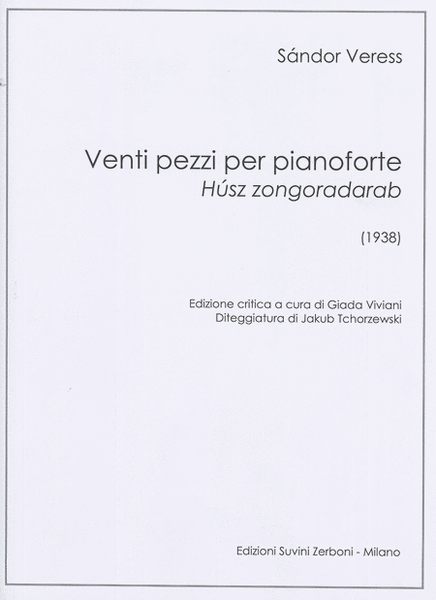Venti Pezzi per Pianoforte
-
Ships in 2 to 3 weeks
Details
Description
SKU: BT.ESZ-01494800
Composed by Sandor Veress. Score Only. Edizioni Suvini Zerboni #ESZ 01494800. Published by Edizioni Suvini Zerboni (BT.ESZ-01494800).With his Venti pezzi per pianoforte (1938), the Hungarian composer Sándor Veress (1907-92) wanted to create a collection of piano miniatures on folk melodies destined for use in the concert hall as well as for teaching purposes. Each piece is based on one or more songs and dances from different Hungarian speaking areas, which are re-elaborated and presented in a carefully conceived alternation of character, musical writing and technical difficulty. The result is a multi-colored overview of Hungarian folk music: songs of a pathetic or even dramatic nature are contrasted with lighter and high-spirited pieces, interspersed with dances of varying types, among which a homogeneousblock stands out formed by the group of Csárdás, a typical tavern dance also used by Liszt. The Venti pezzi per pianoforte represent the culmination of the extensive ethnomusicological research made by Veress in the ’30s and ‘40s, while working as assistant to László Lajtha and to Béla Bartók, and at the same time carrying out field work in Hungary and neighboring countries. The composer intended that this collection should play a fundamental role of mediation between folklore and western “art” music, by revitalizing the language from within, without resorting to the abstractions of the experimentation being developed in Europe at the time. During his lifetime Veress never succeeded in publishing the complete version of the Venti pezzi per pianoforte, but issued various selections of the pieces, two of which remained totally unpublished. The present critical edition prepared by Giada Viviani reconstructs the complete text of the Venti pezzi per pianoforte on the basis of manuscript sources kept at the Paul Sacher Foundation in Basel: the musical scores, with fingering by Jakub Tchorzewski, are accompanied by an introductory essay on the context in which the collection was created, including a description of the state of the sources and a detailed apparatus criticus of the textual variants.
Con i suoi Venti pezzi per pianoforte (1938), il compositore ungherese Sándor Veress (1907-92) ha voluto creare una raccolta di miniature pianistiche su melodie popolari destinate sia a un uso concertistico, sia all’attivit didattica. In ogni branovengono rielaborati uno o più canti e danze provenienti da diverse aree geografiche di lingua ungherese, che si susseguono in base a una sapiente alternanza di carattere, scrittura musicale, difficolt esecutiva. Viene così offerta una variegatapanoramica della musica popolare di questa nazionalit : a canti di contenuto patetico o addirittura drammatico se ne affiancano di più leggeri e giocosi, avvicendandosi a danze di natura differente, tra cui spicca come un blocco omogeneo il gruppodelle Csárdás, tipica danza da locanda utilizzata anche da Liszt.I Venti pezzi per pianoforte rappresentano il coronamento della ricca attivit etnomusicologica condotta da Veress tra gli anni ’30 e ‘40, sia lavorando come assistente di László Lajtha e di Béla Bartók, sia svolgendo ricerca sul campo in Ungheria enei paesi limitrofi. Per il compositore, questa raccolta doveva svolgere un fondamentale ruolo di mediazione tra il folklore e la musica “colta” occidentale, in maniera da rivitalizzarne il linguaggio dall’interno, senza gli astrattismi dellesperimentazioni allora condotte in Europa.Nel corso della sua vita Veress non riuscì mai a pubblicare la versione integrale dei Venti pezzi per pianoforte, mentre ne fece uscire sul mercato alcune selezioni, lasciando del tutto inediti due brani. La presente edizione critica a cura di GiadaViviani ricostruisce il testo completo dei Venti pezzi per pianoforte in base alle fonti manoscritte conservate presso la Fondazione Paul Sacher di Basilea: gli spartiti musicali, corredati dalla diteggiatura di Jakub Tchorzewski, sono accompagnatida un saggio introduttivo sul contesto di creazione della raccolta, dalla descrizione dello stato delle fonti e da un dettagliato apparato critico delle varianti testuali.

 Share
Share